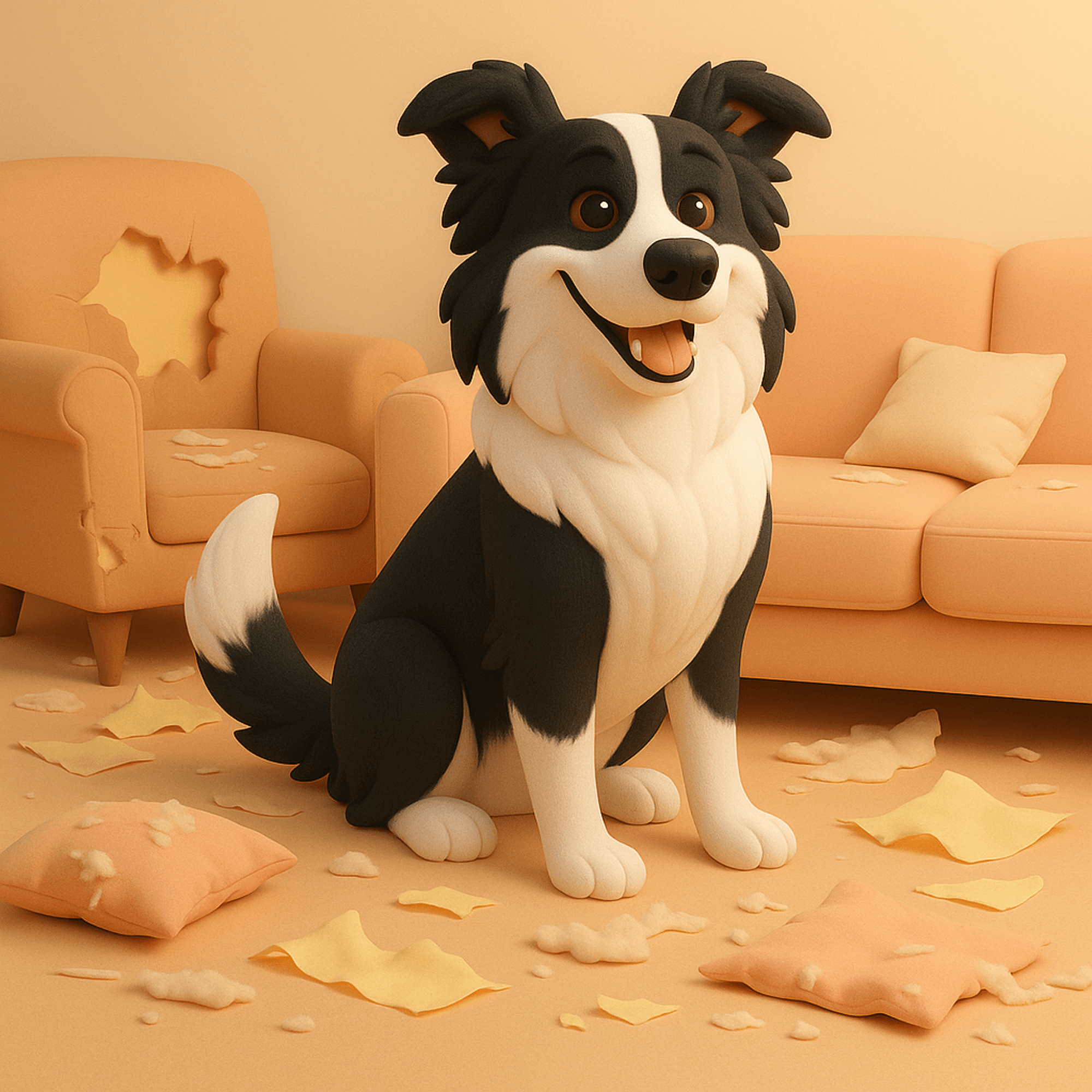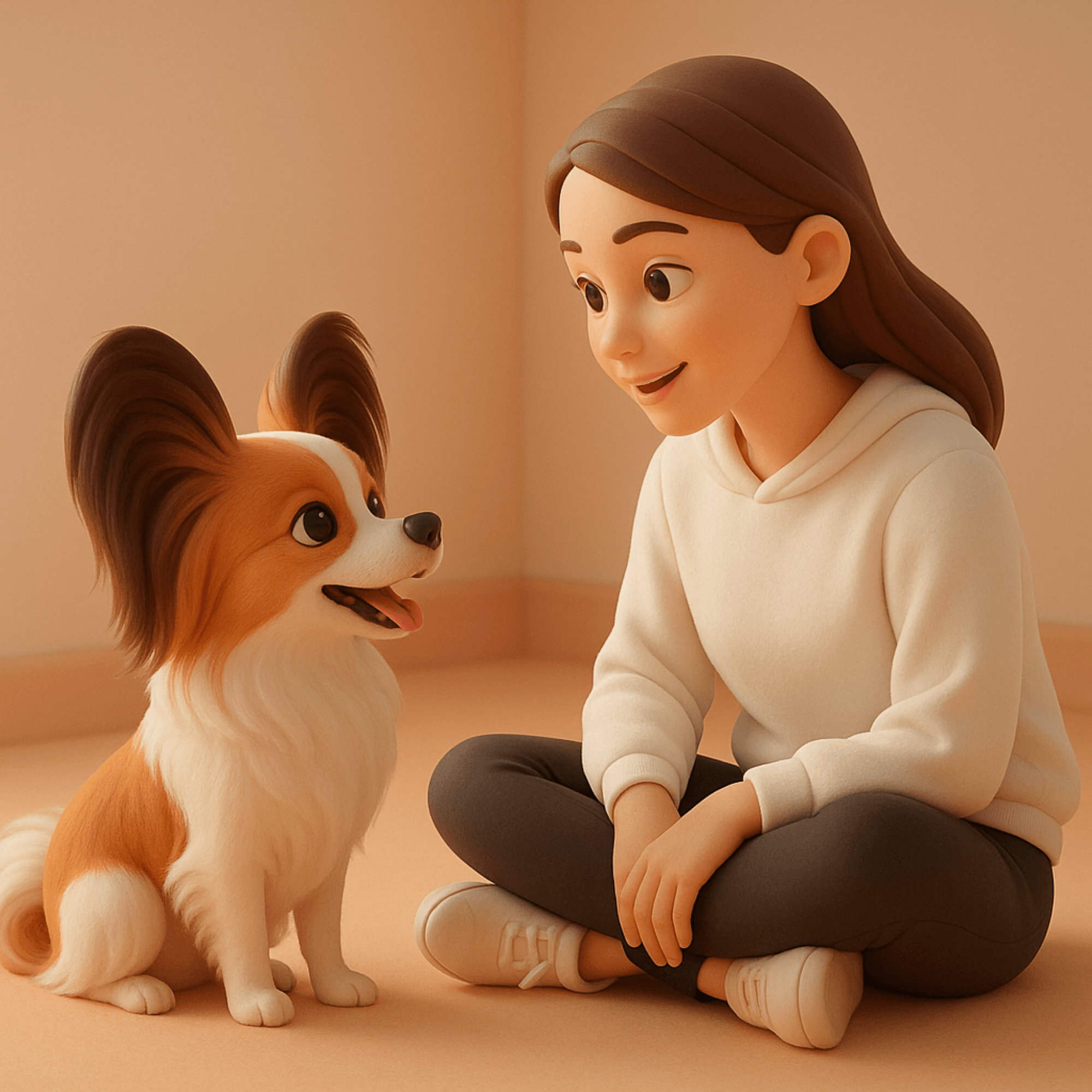
🐾 How to Tell If Your Dog Is Bored? 10 Signs You Can't Ignore
Is your dog starting to act strangely? Is he suddenly barking for no apparent reason, trashing the house, or staring at the wall? It could be more than just a whim—it could be boredom , which is quietly but consistently destroying his well-being.
Boredom in dogs is one of the most frequently ignored, yet most serious threats to their mental and emotional health. It's not just a lack of activity—it's a lack of meaning, stimulation, and relationships that make a dog feel needed and fulfilled . In a world where many people spend long hours outside, and a quick 15-minute walk is enough, dogs can feel lonely, frustrated, and... bored beyond belief.
In this article, we'll show you how to recognize the signs your dog is giving you when they're lacking physical, emotional, and mental stimulation. You'll discover the signs of boredom in dogs, what causes it, and how to prevent it before it becomes a source of behavioral problems and tension in your relationship with your dog.
This guide is more than just a list of tips—it's an invitation to look at your dog through the eyes of mindfulness and care. Ready to find out what your dog is really thinking when he tears up your pillows?

🧠 Can a dog really get bored?
Absolutely, and science leaves no doubt about it. Dogs are animals with a high level of social and emotional intelligence. Their brains need not only exercise but also cognitive stimulation, contact with the environment, and interaction with humans . A lack of these elements can lead to obvious signs of boredom and, in the long term, behavioral and emotional disorders.
Boredom in dogs isn't the same as a brief moment of inactivity. It's a state of cognitive frustration that stems from a lack of stimulation and a repetitive environment. With nothing to occupy their minds or bodies, dogs begin to seek out their own entertainment—often in ways we find difficult to accept.
Importantly, boredom can affect any dog – regardless of age, breed, energy level, or lifestyle. Even a seemingly calm and undemanding pet can suffer from a lack of challenge if its needs aren't adequately met.
➡️ Behavioral studies have shown that dogs left alone for long hours, without a varied environment, show clear signs of stress and frustration: vocalization, destructiveness, stereotypical movements (e.g., spinning in circles), and even self-mutilation.
Therefore, being aware that your dog is bored is the first step to improving his well-being and the quality of your life together. Because a dog is more than just a household member—it's a living, feeling being that needs not only love but also a mental challenge .
❗️10 signs that your dog is bored

Recognizing boredom in your dog is the first step to improving their well-being. Here are detailed symptoms that are often mistakenly attributed to "disobedience" but are actually cries for help and attention . Any of these signs could indicate that your dog isn't getting enough stimulation in their daily life. It's worth observing your pet's behavior, as many of these symptoms appear subtly and gradually worsen.
Here is a list of the ten most common symptoms that you cannot ignore:
1. Constant barking or howling
If a dog barks without a specific stimulus, e.g. looking at a wall, at the door, or just "because" - it may be a form of calling: "Notice me!"
2. Biting furniture and objects
Don't confuse this with teething in puppies. An adult dog who suddenly starts destroying things is likely seeking an outlet for excess energy and emotions .
3. Forcing attention
For example, bringing a toy and dropping it on your lap 20 times a day. Or poking it with your nose. Or... sitting on the laptop. Yes, that's also a signal!
4. Chasing the Tail
Contrary to appearances, it's not always fun. Repetitive spinning in circles can be a symptom of compulsive behavior resulting from a lack of stimulation.
5. Excessive sniffing or digging in the house
A dog who, out of boredom, searches every nook and cranny of the carpet or "digs" in the couch may be trying to keep himself occupied . His tracking instinct demands activity.
6. Aggression or hyperactivity
Jumping on guests, biting, growling for no reason – it is often not a lack of upbringing, but a signal of internal anxiety and frustration .
7. Apathy and low mood
Not all bored dogs are loud. Some simply lie there, staring at the wall, with no desire to play. This could be the beginning of dog depression .
8. Self-mutilation – licking paws until they bleed
Sometimes boredom leads to obsessive substitute activities such as licking, tail biting, or constant scratching.
9. "Zoomies" – sudden running like crazy
If your dog is having "goofy" behaviors every night, it's a sign that his energy is building up and needs to be released. It's best to address this early.
10. Escapes from the garden/house
A dog with nothing to do will seek adventure elsewhere . For him, escape isn't malicious, but an expression of his need for exploration and activity.
🔎 What causes boredom in dogs?
Boredom in dogs doesn't just happen out of nowhere—it's the result of an imbalance between needs and reality . Every dog—regardless of age, size, or breed—has a set of natural instincts that need an outlet. If they don't fulfill them, they become frustrated, and over time... bored.
Here are the most common causes of boredom:
- 🕒 Staying home alone for too long – especially without access to toys, stimuli or background sounds.
- 🚶♂️ Lack of regular and varied walks – monotony of routes and too little time for sniffing.
- 🐕🦺 Lack of contact with other dogs and people – which limits social and emotional development.
- 🧸 Not enough toys and challenges at home – especially interactive ones or those that change from time to time.
- 🗓 Daily repetition – no novelty, change, or surprise in the daily routine.
- 📱 The presence of a caregiver, but no real contact – e.g. the owner works remotely all day but ignores the dog.
A dog can have a full bowl, a warm bed, and the presence of a human, yet still feel mentally abandoned . And it's precisely this boredom that gives rise to behaviors we often describe as "problematic."
🧩 What can you do? 10 ways to deal with dog boredom

Sometimes, a few simple changes are all it takes to turn a bored, frustrated dog into a happy companion again. The key is variety, regularity, and involvement on the owner's part. Here are 10 proven ways to effectively combat boredom in your dog:
- Smell mats and educational toys – activate the sense of smell and stimulate logical thinking. For example, the PETTO croissant , which hides treats in its pockets.
- New walking routes every few days – even a familiar neighborhood can hold new scents if you take the opposite route, through a park, neighborhood, or meadow.
- Meetings with other dogs (controlled!) – contact with other dogs is not only fun, but also learning to communicate and releasing energy.
- Home obedience training – short command sessions 2-3 times a day for 5 minutes each develop concentration and the relationship with the owner.
- Interactive toys and puzzles for dogs – teach your dog to think, plan and act independently.
- Nosework – a fun scent-tracking game – you can use essential oils or hide your favorite flavors. This activity is even possible at home.
- Turning feeding into a game – instead of a bowl: a smell mat, a taste ball, cardboard boxes with holes.
- Hiding treats around the apartment – the classic game of “seek and find” develops the dog’s sense of smell and gives them a target.
- PETTO car seat and shared trips – take your dog to the forest, the lake, or somewhere new by car. The ride itself is already an attraction!
- New daily rhythm – introducing surprises – once a week, have an “adventure day”: a surprise toy, a new place, a logical task.
Small changes = big relief for a dog's brain and emotions.
✅ Checklist: Is your dog bored?
| Symptom | Are you following? |
| Barking for no reason | ⬜ YES / ⬜ NO |
| Destructive behavior | ⬜ YES / ⬜ NO |
| Excessive paw licking | ⬜ YES / ⬜ NO |
| Tail chasing/spinning | ⬜ YES / ⬜ NO |
| Tiredness, no desire to play | ⬜ YES / ⬜ NO |
| Escapes | ⬜ YES / ⬜ NO |
| Hyperactivity in the evenings | ⬜ YES / ⬜ NO |
| Forcing attention | ⬜ YES / ⬜ NO |
| Sniffing aimlessly | ⬜ YES / ⬜ NO |
| Kicking/scratching furniture | ⬜ YES / ⬜ NO |
If you checked 3 or more "YES" – your dog is bored. Respond!
🌿 Enrichment – what is it?
Enrichment is a concept that's increasingly being used in the context of animal welfare—both wild and domestic. Loosely translated, it means "enriching the environment," or providing a dog with a variety of stimuli that stimulate its mind, senses, and emotions .
It's not just about play—it's about fulfilling a fundamental need for cognitive activity . For a dog, this means everyday situations that engage their senses of smell, hearing, sight, touch, and social emotions. It's the lack of such stimuli that most often leads to frustration and behavioral problems.
Examples of enrichment:
- 🐽 Treat Hiding Game – Engages your nose, brain and cleverness.
- 🧩 Smell mats and toys with pockets – develop patience and attentiveness.
- 👃 New scents in the environment – e.g. dried herbs, spices in safe containers.
- 🎯 Mental tasks – searching for toys after a command, differentiating sounds.
- 👣 Walking routes with varied surfaces – grass, gravel, bark, sand.
- 🎲 Logical toys – such as puzzles, flavor balls, educational boards.
You don't need expensive gadgets—just a cardboard box, a towel, and a handful of crisps. The key is creativity and consistency .
Enrichment isn't a whim. It should be as commonplace as a bowl of water. It's a daily mental exercise that not only keeps your dog from getting bored, but also helps them develop, calm down, and build a stronger bond with you .
Play is not a luxury – it is a biological need .
🧠 What about elderly or blind dogs?
We often think that older dogs or dogs with limitations like blindness or hearing loss no longer need stimulation—that rest is enough for them. This is one of the biggest myths about caring for senior dogs. In reality, these dogs are the ones who most need variety and enrichment in their environment , albeit in a form adapted to their abilities.
What they need:
- 🧠 Mental stimulation – to keep the brain active, which delays the cognitive aging process.
- 🐾 A sense of security and predictability – but without monotony.
- 💛 Closeness and interaction – even short exercises can be a great opportunity to build bonds.
Practical ideas:
- Sniffing games while lying down – e.g. hiding treats in soft mats.
- Tactile exercises – the dog can learn simple commands like “left paw” and “right ear” through gentle contact.
- Voice and sound commands – e.g. click for a treat.
- Mental walk – even a short walk around the house, as long as it is full of new smells and sensations.
Remember that every dog—even blind, hard of hearing, or slow— still wants to learn, explore, and feel needed . Properly tailored enrichment for a senior dog can significantly improve their quality of life and delay brain aging.
💡 Instead of shouting – plan

If you notice your dog destroying something out of boredom, don't yell . Instead of finding fault, it's worth considering why it happened . A dog's destructive behavior is often the final stage of their silent cry for help, one we didn't notice before.
Ask yourself these questions:
- Did your dog have any contact with you today – not only physically but also emotionally?
- Did he have a chance to let loose, explore, and play?
- Was his day varied or exactly the same as yesterday and the day before?
If the answers are not satisfactory, it's time for an action plan .
✅ Instead of frustration – introduce an enrichment routine .
✅ Instead of punishing – create space for exploration .
✅ Instead of prohibitions – give alternatives .
Remember, a dog doesn't understand "anger," but they perfectly understand "understanding." Your calm, consistent, and caring demeanor can work wonders—far more than a raised voice.
A good plan is not a punishment after the fact, but a strategy for the future.
🎯 Summary
Boredom is your dog's silent enemy. You don't see it immediately, but its effects can be long-lasting and profound—from compulsive behaviors to emotional and relationship problems. Boredom doesn't discriminate—it affects both energetic and seemingly calm dogs. Its signs are often confused with disobedience, but in reality, it's just a dog's way of surviving in a world without stimulation.
If you recognize worrying signs in your pet, don't blame yourself—just take action. Every change, even the smallest, can bring a significant improvement to your dog's quality of life.
🎾 Just a few minutes a day is enough to create a world for your dog where their mind will work and their heart will feel safe. Shared games, walks, new scents, and tasks aren't chores; they're an investment in your relationship.
Because a happy dog is not just one with a full bowl – but one who also has a head full of challenges, stimuli and love .
Observe. React. Plan. Because a happy dog isn't just one with a full bowl—it's one with a head full of challenges and fun .
🌐 Recommended scientific and practical sources
- Royal Veterinary College – Animals suffer boredom too
- Animal Behavior – Bestial boredom: a biological perspective
- Animal Welfare – Is boredom an animal welfare concern?
- AKC – How to recognize and help bored dogs
- RSPCA Knowledge Base – Why is enrichment important for dogs?
- MDPI – Environmental Enrichment for Dogs: Pilot Study
📚 Additional materials
- 🏙️ Best dogs for apartments – breed ranking
- 💬 How Do Dogs Show Affection? Signals You Should Know
- 🐕 Is your dog pulling on the leash? Find out how to fix it.
- 🚗 How to safely transport a dog in a car?
- 🐾 How to teach your dog to stay home alone
- 🛏️ Can a dog sleep in bed with its owner? Facts, myths, and behavioral advice.
See more at: Petto.com.pl
























 https://petto.com.pl
https://petto.com.pl